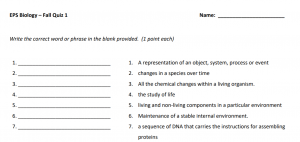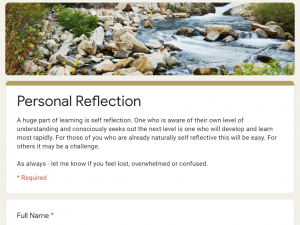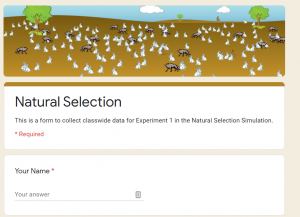(1) Designs major assessments that reflect course outcomes and posts them at the start of each trimester
(2) Designs assignments to be graded and returned in a feedback cycle of seven calendar days
(3) Ensures the number of assignments in each course is neither excessive nor deficient — providing appropriate time for quality student performance and meaningful teacher feedback
(4) Designs major assessments that reflect course outcomes and posts them at the start of each trimester
 Courses are designed to include projects, traditional tests, labs and skill specific tests.
Courses are designed to include projects, traditional tests, labs and skill specific tests.
- Major Assessments include the traditional tests and the projects. EPS Biology – fall quiz 1
- Placed on the calendar at the beginning of the trimester on the earliest possible date they will occur.
- As the trimester progresses, there are times where those dates move.
- a calendar adjustment to avoid a conflict with another major events like an MA in another class or tech week for the play etc.
- The second adjustment is much more nuanced, and it involves individual due dates for each student or group where they choose their due date. This option is usually invoked when there is a class presentation component to the project. This enables the class to have a natural schedule where they are viewing one or two presentations a day which avoids audience fatigue and allows better engagement and also enables the class to continue moving through other curriculum.
- Laboratory activities are chosen based on the following criteria.

Calorimetry Lab set up Here’s an example instructions Calorimetry Lab and here’s a sample Calorimetry lab Notebook Page
- Opportunity to engage students in scientific thinking and planning
- Reinforce the concepts discussed and read about during each unit
- Give students an opportunity to see and apply ideas associated with the Major Themes
- Practical lab Skills that both improve fine motor skills and are useful in future applications
- Labs are assessed in three different ways
- Skills Tests are administered for key procedures or equipment
- Scientfific Reports are written to assess planning, organization and analytical skills
- Group interaction and social skills are being constantly assessed and addressed on an individual basis.
(5) Designs assignments to be graded and returned in a feedback cycle of seven calendar days
Grading is split into four categories: Major Assessments (40% of grade), Responsible Action (20% of grade), Graded Assignments (50% of grade) and Other Assignments (no grade)
- Major Assessments – Here’s a sample test EPS Biology – fall quiz 1

- Mixture of group and individual assignments/projects
- Group projects have built in feedback for their groupmates as well as a self assessment and reflection piece to develop their skills as supportive and productive group members
- Usually graded same day for live presentations
- Presentation rubrics emphasize content, planning and organization
- Feedback is also given about eye contact, pace, volume etc, but not graded to reduce the anxiety and stress associated with presentations
- Returned in 7 days for written exams with score and specific feedback. Time taken in class to highlight patterns identified in the test and explain how upcoming unit will be adjusted to address these patterns
- Mixture of group and individual assignments/projects
 Responsible Action: These are activities and assignments that I see as important for students to develop into well rounded students, but that I want students to take personal risks to enable more growth. They are generally graded for completion to reduce the chance that students will answer what they think I want to hear.
Responsible Action: These are activities and assignments that I see as important for students to develop into well rounded students, but that I want students to take personal risks to enable more growth. They are generally graded for completion to reduce the chance that students will answer what they think I want to hear.
- Reflections – some samples Fall Reflections Presentation Self Evaluation
- Peer feedback – after presentations – Immune System Presentation Feedback
- Individual meetings schedule in outlook can be initiated by students or teacher
- Graded Assignments –
- Individual requirements some are graded on content some on completion.

- Here’s a sample of an assignment on Natural Selection
- Evolution Natural selection simulation_1 – student worksheet 2019
- and the form they submit to contribute to the class data set Natural Selection Assignment form
- Here’s a sample of an assignment on Natural Selection
- Restriction of time, space or tools often given to force students to think in new ways
- Individual requirements some are graded on content some on completion.
- Other Assignments
- These are assignments that I want students to complete and warrant having a place on Canvas, but that for some reason I don’t want to affect their grade. These are often readings, videos or other resources that I will not be spending time in class discussing and will not be required information for the tests. They are included to help students see the bigger picture and provide perspective for aspects of biology that we can’t fit into class. For students who are struggling to keep up with the pace of class, I coach them that these assignments are the first thing they should drop from their list of things to do.
(6) Ensures the number of assignments in each course is neither excessive nor deficient — providing appropriate time for quality student performance and meaningful teacher feedback

- For a 10 week course I target 2-3 Major Assessments, 10-15 Graded assignments and 4-5 Responsible action assignments.
- Personal goal is to have at least 2 personal connections with each student per week these occur in a number of different ways
- Meetings outside of class
- Discussions and feedback during class
- Written feedback and discussion via Canvas or Email
In the future, I want to develop a system to track all interactions with a student in one place to make it easier to identify and follow up with students who I have not connected with recently.
Good work
Thanks – I spend a lot of time on that